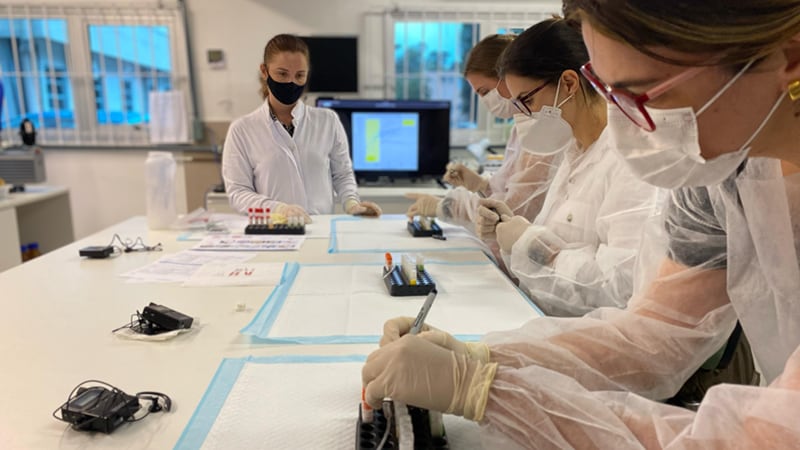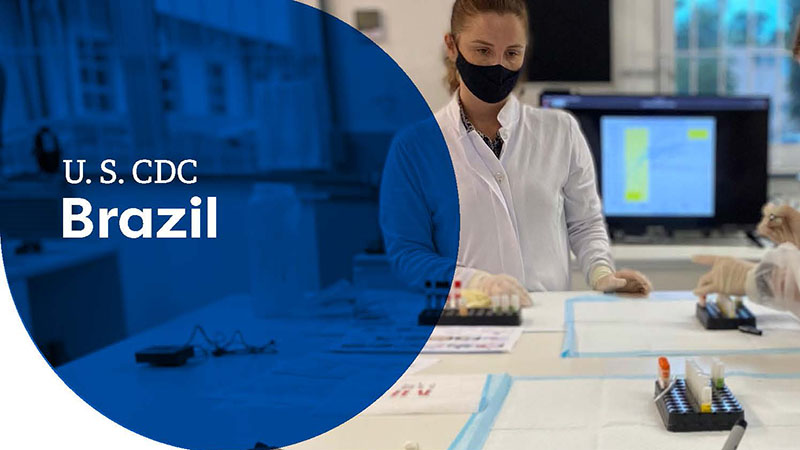At a glance
CDC works with the Ministry of Health (MOH) and other partners to build effective public health collaboration and partnerships, which strengthen the country's core public health capabilities: data and surveillance, laboratory capacity, workforce and institutions, prevention and response, innovation and research, and policy, communications, and diplomacy.

Overview

CDC opened a country office in Brazil in 2003. In 2020, CDC launched the South America Regional Office, based in Brazil, as part of the agency's global health approach to include regional engagement.
CDC Brazil works closely with the MOH, Oswaldo Cruz Foundation (Fiocruz), and other partners to detect, prevent, and control infectious disease outbreaks, and build and strengthen the country’s core public health capabilities. These include data and surveillance, laboratory capacity, workforce and institutions, prevention and response, innovation and research, and policy, communications, and diplomacy. CDC’s work aims to protect the health of our nations and public health around the world.
Emergency response
CDC’s pandemic preparedness and response efforts provide support to enhance Brazil’s ability to prevent, detect, and respond to infectious disease outbreaks. CDC works with partners to strengthen Brazil’s public health systems by providing technical expertise in disease surveillance, laboratory systems, and emergency response. Examples of CDC’s work in this area include:
- Expanding the genomic surveillance capacity by supporting partners to identify genetic characteristics and monitor any mutations of SARS-CoV-2, influenza, and respiratory syncytial viruses.
- Providing technical assistance to Brazil’s National Laboratory Quality Technical Working Group (NLQTWG). This group was created to establish and implement a formal process to improve the quality of public health laboratories.
- Supporting the MOH in establishing a Public Health Emergency Management Program aimed to improve preparedness and response to disease outbreaks as well as climate-related disasters.
- Partnering with Fiocruiz and other partners to conduct a mass testing and vaccination campaign during the COVID-19 pandemic in Maré, one of the most vulnerable communities in Rio de Janeiro.
Key achievements
- By July 2022, scientists at Fiocruz had shared over 50,000 virus samples from COVID-19 into a global data bank.
- The NLQTWG successfully institutionalized a formal process for quality management improvement of their public health laboratory.
- Portuguese-speaking epidemiologists and laboratory experts were deployed to investigate COVID-19 spread.
- The mass-testing and vaccination campaign in Maré led to a 154% relative increase in case detection and reporting to official databases and reduced weekly reported deaths by 46% from September 2020 to April 2021.
Workforce development
CDC provides technical support to Brazil's Field Epidemiology Training Program (FETP), called EpiSUS. This program trains Brazilian field epidemiologists to rapidly respond to emerging health threats by gathering critical data and turning it into evidence-based action. FETP graduates have played important roles in responding to public health emergencies like zika, chikungunya, yellow fever, floods, and mudslides.
In 2024, CDC worked with World Health Organization (WHO) and I-TECH to bring the Informatics and Data Science for Health (IDASH) Program to five countries in South America, with substantial participation in Brazil. IDASH is a 12-month competency-based fellowship program that provides training and mentorship to current and future public health leaders in the areas of public health informatics and data science.
Key achievements
- In 2023, more than 3,100 Frontline, 697 Intermediate, and nearly 170 Advanced residents graduated from FETPs in Brazil.
- In 2017, Brazil's FETP became the first program in Latin America to receive accreditation from the Training Programs in Epidemiology and Public Health Interventions Network (TEPHINET). It was reaccredited in 2023.
HIV and TB
As a key implementer of the U.S. President's Emergency Plan for AIDS Relief (PEPFAR), CDC plays an essential role in the fight against HIV and TB. With unmatched scientific and technical knowledge and long-standing relationships with ministries of health, CDC's expertise is uniquely positioned to advance HIV, TB, and other global health security activities that keep Americans safe at home and abroad.
Through PEPFAR, CDC provides critical support to Brazil's public health infrastructure, improving the country's ability to prevent, detect, and respond to HIV, TB, and other infectious diseases and minimizing their risk from entering the U.S.
Antimicrobial resistance and infection prevention and control
CDC supports many activities to improve healthcare infection prevention and control (IPC) and slow the spread of antimicrobial resistance (AR) and other emerging threats in Brazil.
The country is part of CDC's Global Antimicrobial Resistance Laboratory and Response Network (Global AR Lab and Response Network) and the Global Action in Healthcare Network (GAIHN)-Healthcare-Associated Infection Module.
Through this network, CDC works with Ministry of Health in Brazil, Fiocruz, ANVISA and academic partners to:
- Strengthen laboratory AR detection methods and AR surveillance reporting in 25 sentinel labs and hospitals throughout the country.
- Support two pilot hospitals to implement AR detection and IPC response for emerging AR threats such as carbapenem-resistant Enterobacterales and carbapenem-resistant Acinetobacter baumannii.
- Provide trainings and strengthen Candidemia laboratory surveillance and antifungal susceptibility testing capacity in over 30 sentinel hospital labs.
- Develop and implement innovative methods to support HAI surveillance through GAIHN-HAI.
- Strengthen detection, reporting, and response for emerging resistance in Bordetella pertussis (whooping cough).
Key achievements
- As of September 2023, 2,122 bacterial and 292 fungal specimens were submitted by sentinel labs to the national reference lab participating in the Global AR Lab and Response Network-Fiocruz collaboration for advanced AR testing.
- Between 2022 and 2023, over 1,000 laboratorians were trained in both bacteriology and mycology as part of the Global AR Lab and Response Network -Fiocruz collaboration.
- With CDC support through GAIHN-HAI, a multidisciplinary team at Hospital Moinhos de Vento published on the genomic epidemiology of SARS-CoV-2 in Porto Alegre and described a SARS-CoV-2 variant (CK.1) that was not previously identified in Brazil.
- The national laboratory network expansion of molecular diagnosis for Bordetella pertussis led to the identification of one positive tests in 2022, 2 positive tests in 2023, and 130 positive tests by May 2024.
Neglected tropical diseases
CDC also works to address the presence of neglected tropical diseases (NTDs)—including chagas disease, leishmaniasis, lymphatic filariasis, and trachoma. These diseases significantly impact health in Brazil, especially among people experiencing poverty.
Key achievements
In collaboration with Brazilian laboratories, CDC developed a test using multiplex immunoassay technology, which allows the detection of multiple diseases in one test. This allows public health workers to gather important public health data about these diseases at a much lower cost compared to traditional methods that test one disease at a time.

